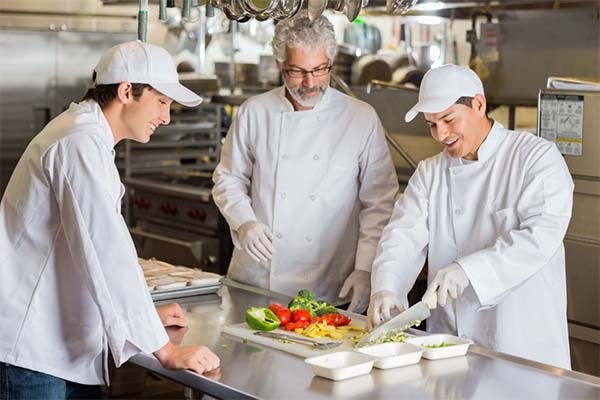Worldwide Food Service Safety Monthly observed every December and helps us review food safety rules in the food industry and how they affect our health. While we all enjoy tasty food and tempting smells, it is crucial to focus on the cooking process and hygiene before, during, and after meal preparation. This month is a great reminder of that.
History of Worldwide Food Service Safety Month
Cooking has come a long way, evolving into a variety of dishes and recipes worldwide. What started as cherished family recipes has expanded to inns, restaurants, cafeterias, dinners, and grills, where people can enjoy different cuisines.
Concerns about food safety have been around for a long time, especially regarding food adulteration and preservation. Ancient Egyptians, Chinese, Greeks, and Romans were among the first to preserve food using methods like sun-drying and smoking.
However, organized efforts to ensure food safety and sanitation began in 12th and 13th century England, focusing on preventing fraud and adulteration as food production shifted to bakeries and factories.

In the U.S. and several European countries, worries about cleanliness grew as science started linking dirt to diseases. Towns were told to create health committees and appoint officers to oversee and enforce sanitation.
This laid the groundwork for many safety regulations in the U.S. and around the world as science discovered infectious diseases caused by microorganisms and how they could spread through food.
| 375 B.C. (First Instance of Food Safety) | Food adulteration is mentioned by Indian philosopher and economist Chanakya in his book “Arthashastra”. |
| 1202 (Assize of Bread and Ale Law) | King John of England promulgates the law to increase the quality of bread and ale, and stop adulteration. |
| 1900s (Rise of Food-Borne Diseases) | An outspread of food-borne diseases and deaths occur, and the first food-safety and labeling regulations are established in the U.S. |
| 1994 (Food Safety Month Established) | National Food Safety Month is set up in 1994 by the National Restaurant Association. |
5 Food Safety Facts That Will Keep You Alert
- Cross-Contamination Can Happen Anywhere: Bacteria and pathogens can spread beyond just raw meat. They can transfer from cutting boards, utensils, and even your hands to other foods if proper hygiene is not maintained. Always clean and sanitize surfaces and tools after preparing raw ingredients.
- The Danger Zone Is Real: Bacteria grow most rapidly between 40°F (4°C) and 140°F (60°C), a range known as the “danger zone.” To keep food safe, it’s crucial to keep perishable foods either refrigerated or cooked to the proper temperature to prevent bacterial growth.
- Not All Foods Need to Be Refrigerated: While many perishable foods require refrigeration, some items like honey, whole melons, and certain condiments can safely be stored at room temperature. However, always check food labels and guidelines to ensure you’re storing items correctly.
- You Can’t Always Smell Spoiled Food: Many harmful bacteria, like Salmonella and E. coli, don’t change the smell, taste, or appearance of food. Even if food seems fine, it might still be unsafe. It’s best to follow guidelines for safe storage and cooking practices.
- Hand Washing Matters More Than You Think: Proper hand washing is one of the most effective ways to prevent foodborne illnesses. Wash your hands with soap and water for at least 20 seconds before handling food, especially after using the bathroom or touching raw meat.
Conclusion
In conclusion, Worldwide Food Service Safety Month observed every December, served as a crucial reminder of the importance of food safety in protecting our health. As our culinary practices have evolved from ancient preservation techniques to modern dining experiences, maintaining rigorous hygiene and safety standards has become essential.
The history of food safety highlights the ongoing efforts to prevent foodborne illnesses and ensure quality, from early regulations to contemporary practices. By staying vigilant against cross-contamination, understanding the dangers of improper food storage, and adhering to proper hand-washing techniques, we can contribute to a safer food environment. This month encourages everyone to review and reinforce these practices, ensuring that every meal is not only delicious but also safe.
Frequently Ask Question
1. What is Worldwide Food Service Safety Month?
Worldwide Food Service Safety Month is observed every December to review and reinforce food safety rules in the food industry. It emphasizes the importance of proper cooking, hygiene, and safety practices before, during, and after meal preparation.
2. Why is food safety important?
Food safety is crucial because it helps prevent foodborne illnesses caused by bacteria, viruses, and other pathogens. Ensuring proper food handling, cooking, and storage practices protects our health and prevents the spread of harmful microorganisms.
3. What is the history of food safety?
Food safety has a long history, starting with ancient preservation methods like sun-drying and smoking used by civilizations such as the Egyptians, Chinese, Greeks, and Romans. Systematic efforts to ensure food safety began in 12th and 13th century England and continued with the development of sanitation regulations in the U.S. and Europe as scientific understanding of diseases advanced.
4. When was National Food Safety Month established?
National Food Safety Month was established in 1994 by the National Restaurant Association to promote food safety awareness and practices within the food service industry.
You may also like to read, National Choose Your Chocolate Day – September 16, 2024
